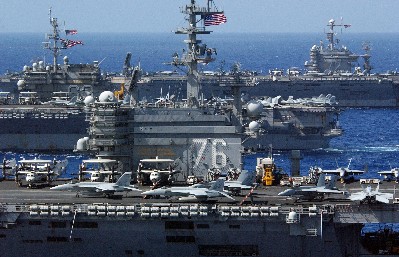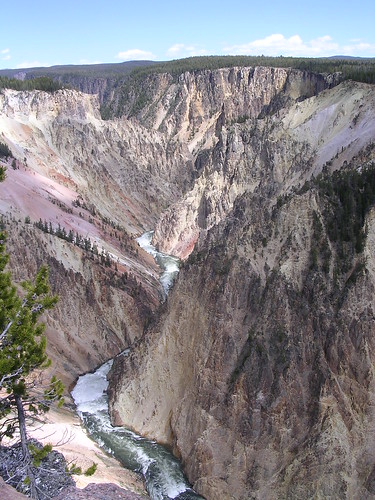The Friday Furo Questus
Warning: it's a long one.
Questus Furore - Dangerous Minds in Dangerous Times
What a weird and wild week.
Over the weekend, the New York Times revealed the existance of a top secret program to monitor financial transfers, with the intention of intercepting funds heading for terror groups and tracing their moneymasters. This was a program that worked, that the Congress (its leadership, at least) knew about, was legal, and so far had proven effective. The Times printed the story anyway, despite requests and pleas from the Administration to not publish, and rendered one of our key intelligence operations in the War on Terror inert. Such callous carelessness in times such as these is inexcusable; but it likely will also go unpunished.
On September 24, 2001, the Times was demanding that the Administration do something about terroist financing. How quickly memory fades.
And the real crimnials are the leakers - those who decided to talk, even though they had sworn an oath to keep quiet. But the penalty for oath-breaking is pretty mild today, at least in the civil service. Soldiers take a rather dimmer view of betrayal.
Then yesterday, the Supreme Court ruled against the United States government in Hamdan vs. Rumsfeld, stating that the President did not have the authority to try the prisoners captured by the United States on the battlefield to trial by military tribunal.
The usual critics came out and said this decision was a victory for truth, justice and democracy. (Since, according to them, Bush is against those things, and also puupies, kittens, rainbows, and sunlight.) I'm not convinced that the decision means as much as they think, given the sharp divide of the decision. (The decision was 5-3, with Scalia, Thomas, and Alito in the minority. Chief Justice Roberts abstained, as he had ruled on this case as an appeals court judge before - and upheld the government's position.)
While much remains to be written and said about the ultimate results of the Supreme Court's Hamdan decision, and I'm not the legal scholar they are, I'll admit to being somewhat confused by this decision. In World War II, FDR ordered military tribunals to prosecute some German agents who were captured in a bungled attempt to start a sabotage campaign against American defense industries. This decision removes that precedent, and sends the government back to the drawing board and to Congress.
Why do I have a sick feeling in the pit of my stomach all of a sudden?
One point of concern is that the majority cites American law and the Geneva Convention in making concerns known over the detention of prisoners at Guantanamo Bay. There's one major problem with this approach.
Al Qaeda and its affiliated groups are not signatories to the Geneva Convention, and they are not part of any state's military. There are some, who claim that they are legitimate resistance fighters. If they were, they may be right, but there's a problem with that line of arguement. Al Qaeda is a stateless organization, whose stated goal is the creation of a caliphate, a totalitarian government flavored with extreme Islam. They're not resisting anything - they're seeking to overturn.
In my mind, they are analagous to pirates - stateless actors making war against all comers.
These two events, in and of themselves, are not catastrophic. They are pebbles in a much greater landslide. The latter is simply government, working as it was meant to; however I do believe the Supreme Court did not make the right decision.
The New York Times' blabbing is a greater concern, because it is illustrative of an all too common attitude.
Only those enlightened few, such as the New York Times, know the Truth. Only they. So there is no rule they do not feel justified in violating, no confidence they feel uncomfortable in divulging, no oath that is not worth breaking in service of that Truth. And they will not rest until every knee bows down to that Truth.
The problem is, their Truth is not what the rest of share. And it constantly shifts, never constant.
Peace, defined only as the absence of conflict, has become a virtue superior to all others - even at the expense of other virtues. Justice, tolerance and liberty have become buzzwords. We now not only hold all men equal, despite their works, but we hold all ideologies equal, even those diseased as the Islamist vision Bin Laden so gleefully advocates.
We fear to judge, for we have been told that judging is wrong. We refuse to differentiate, compare, and hold one thing better than another. In this modern view, the only differences between gold and dross are superficial.
We continue to become a nation incapable of rousing to its own defense.
Recommended Reading
Victor Davis Hanson, "Winning the Iraq Wars."
Michael Ledeen, "It's the Terrorism, Stupid."
"An Outrage." The Editors of NRO comment on the Hamdan decision.
In deciding as it did, the Court also ignored its own venerable precedent — of over a half-century’s standing — that the Geneva Conventions, even when they do create binding obligations on governments, do not create judicially enforceable rights for individuals. Disputes over their application are, rather, to be worked out diplomatically, among the political representatives of sovereigns. Moreover, the Geneva Conventions were irrelevant to Hamdan’s case. He is a terrorist combatant who fails to meet the conventions’ definition of a prisoner of war; consequently, he is not entitled to the conventions’ POW protections. In order to get around this inconvenient fact, the Court had to invoke (and distort) “Common Article 3” of the conventions, which applies only to civil wars taking place within the territory of a single country, as opposed to international conflicts. The Court argued, absurdly, that because al Qaeda is not a nation, it cannot be in an international conflict: so the global War on Terror is not “international,” despite having been fought in the United States, Somalia, Yemen, Kenya, Tanzania, Afghanistan, and Iraq. As for Article 3’s requirement that the conflicts to which it applies be confined to a single country, the Court’s majority found an easy way to get around it: by ignoring it.Jed Babbin, "Into Hamastan."
Palestinians are the only people apparently incapable of acting in their own self-interest. For generations they have been willfully ignorant of the fact that their refusal to make peace with Israel serves only their enemies. Since Israel was created by UN mandate, the Palestinians have been rejected by Jordan (itself 60% Palestinian), Egypt and Syria. Saudi Arabia and Lebanon don't want them. But for decades under Arafat, the Palestinians did the bidding of the same countries that rejected them. Syria, Egypt, Saudi Arabia and others bought Arafat's regime for the price of terrorist campaigns against Israel. They fund and provide sanctuary for Hamas and other Palestinian terror groups for two reasons: first, to keep alive the Palestinians' hope of erasing Israel from the map; and second to absorb the casualties in the terror war against Israel that those nations don't wish to suffer. In the Middle East, the stability that we have helped nurture is the stability of terrorist states.Nicole Gelinas, "Subverting The War On Terror."
Powerline - "That's The Storyline." Never let the truth get in the way of a good story. And so my low opinion of reporters drops even lower.
Thought of the Week
"It should be the highest ambition of every American to extend his views beyond himself, and to bear in mind that his conduct will not only affect himself, his country, and his immediate posterity; but that its influence may be co-extensive with the world, and stamp political happiness or misery on ages yet unborn."
George Washington
Churchill Quote of the Week
"I was only the servant of my country and had I, at any moment, failed to express her unflinching resolve to fight and conquer, I should at once have been rightly cast aside."
Winston Churchill






